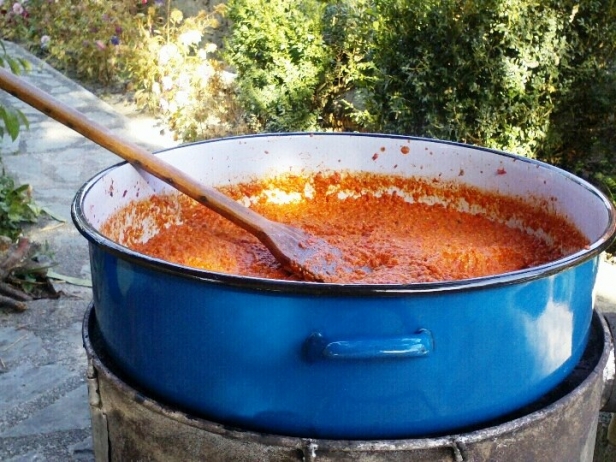Making ajvar [2], a pepper-based condiment and one of the most sacred Balkan traditions, has been facing unexpected impediments in its native Macedonia during the last several years.
The preparation of this winter food characterizes autumn in Macedonia, and its significance goes far beyond simple cooking, but has a cultural, almost ritual value. Ajvar is a family matter that usually gathers relatives, friends and even neighbors.
As such, it often draws the attention of foreigners residing in the country, including the current ambassador of The Netherlands to Macedonia, who recently tweeted:
Долг процес, но одличен резултат: #ајвар [3] и лутеница pic.twitter.com/6EyA1W2RvF [4]
— Wouter Plomp (@NLAmbPlomp) October 6, 2017 [5]
Lengthy process, but great result. Ajvar and lutenica [6].
For such an important tradition, it might be surprising to learn that authorities have take steps over the years to limit the making of ajvar. In 2008 the populist government that ruled Macedonia from 2006 to 2017 made one of its less popular moves, passing a law that outlawed making ajvar on public grounds.
#Ајвар [7] pic.twitter.com/a7wCdzZO15 [8]
— ⚔ William Wallace ⚔ (@WillWallaceJR) 3 de octubre de 2016 [9]

Roasting paprika, first stage in ajvar preparation.
While owners of plots of land could do it in their own yard (equivalent to making barbecue in the US), citizens living in apartment buildings were prohibited from doing it on common lawns, in front of their garages or other venues that had served them for the last 30, 40 or 50 years.
According to Libertas [10] news site, the “Law on Public Cleanliness” slaps a 50-euro fine on anyone using a metal stove in a public space. “On the other hand,” the site notes, “some citizens say that these fines are necessary.”
In 2016, a series of tragicomic events took place in which people, usually elderly or poor, faced arrest and fines for ajvar preparation outdoors. Many observers pointed to the police interventions as an example of harassment by a government wanting to instill fear of the state in the population
Macedonia's new government, which came into office at the end of May 2017, has taken a far more lenient attitude towards ajvar-making. So far, there haven't been reports of any similar police actions, but memories of last season remain fresh in the mind of many Macedonians.
Далечната 2016, се’ друго беше во ред во државата, освен правењето #ајвар [3] на јавно место.https://t.co/DHTkrSQG67 [11]https://t.co/vp6bFpMlGL [12] https://t.co/uPVtwf7ksG [13]
— Ladislav Cvetkovski (@Ladislavcc) October 6, 2017 [14]
Tweet: Long ago, back in 2016, everything was OK in the country, except the preparation of ajvar in public spaces.
Link title: “Around ten people have been fined for making ajvar”
In 2016, since the preparation of ajvar and various other winter foods (“zimnica”) had never been the target of police interventions before, some surprised citizens were caught “red-handed” (literally) by the police. The fines were mostly met with humor and satire, but there were also cases of genuine defiance:
pic.twitter.com/PijaXLq9YJ [15]
— EmptyPersona (@darkhour_seeker) October 4, 2016 [16]
Upper image, showing members of the previous government who are accused of corruption [17]: “These are innocent”
Lower image, showing people preparing ajvar: “There are criminals”
Social media users in Macedonia continue to recall last year’s events, when the preparation of Macedonia’s favorite winter food could have gotten you in trouble with the law.
Here are some of the reactions on Twitter and Facebook that still get shares and likes, popping up in the timelines of Macedonians a year after they had been written:
Forgive me father for I have been roasting. #аjvar [18]
— Една е Тетка! (@TheTetka) October 4, 2016 [19]
Forgive me father for I have been roasting. #аjvar
Кај што има чад има и ајвар.
-МВР
— ÅLEKSÅNDÅR (@Aleksandermen) October 3, 2016 [20]
Where there is smoke there is ajvar.
– Ministry of Interior
Some, like Sonja Zafirovska, had joined the discussion [21] on Facebook:
2035 година
Бабо, зошто лежеше во затвор?
– Синко ме фатија на лице место како правам Ајвар и слушам Српска музика.
Year 2035:
Grandma, why had you been in jail?
– My grandson, they caught me red-handed preparing ajvar and listening to Serbian music.
Boban Bobby Dimovski asked [22]:
А дали ако моите купиле пиперки за ајвар и ме тераат да им помагам се рачуна као семејно насилство???
So if my parents have bought red paprika for preparing ajvar and they want to make me help them, would this be considered as domestic violence???
Aleksandra Milenkovic Vasilevski shared a link [23] to a satirical article titled “Dangerous network for illegal ajvar making busted, three severely hurt with fifth-degree burns” and commented [24]:
„Можеби киднаперите на деца, педофилите, силувачите, дилерите на дрога и оружје, функционерите кои украдоа милиони се на слобода, но конечно се чувствувам слободен и безбеден, можам мирно излезам пред зграда без да бидам нападнат од мирисот на ајвар“ ….ееее тоа ти е МК
“Maybe child kidnappers, pedophiles, rapists, drugs and arms dealers, officials who stole millions are free, but finally I feel free and safe, I can peacefully go outside without being attacked by the odor of ajvar” ….. aaaaand this is Macedonia.
Even though the police pressure has relaxed, and the smell of roasted papers is once again wafting through the streets, the fact is fewer and fewer young people are deciding to take up the preparation of ajvar.
The busy modern lifestyle doesn't favor devoting whole weekends to kneeling besides a stove with a wooden spoon. Thanks to advances in the canned food industry, many companies have begun producing ajvar with a quality comparable to grandma's. And therein may lie a far more potent danger to the tradition that could endure any regime change.
